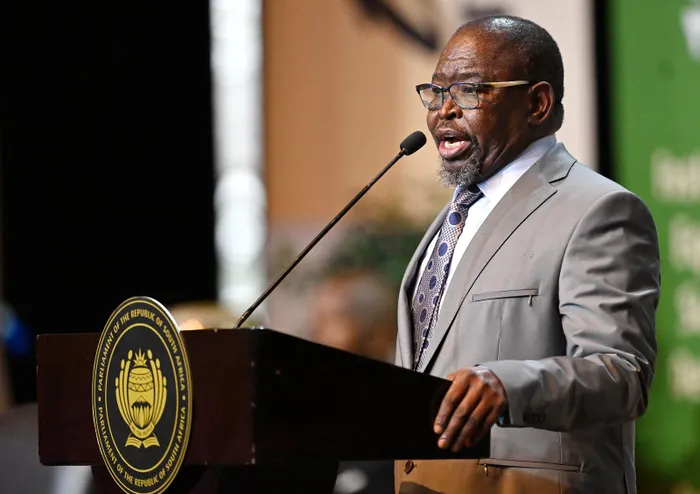Impact of rising fuel levies on developers: increased input costs and tighter margins ahead

Minister of Finance Enoch Godongwana, proposed a fuel tax increase, which will go towards the shortfall left by the cancelled VAT hike on Wednesday.
Image: Phando Jikelo/ Parliament of SA
Higher fuel levies and reduced revenue projections could translate into increased input costs, tighter margins for developers, and slower project rollouts, particularly in the affordable housing space.
Dr Meshel Muzuva, the academic programme leader at the Management College of Southern Africa (MANCOSA) School of Business Excellence, said that the fact that baseline departmental budgets and critical infrastructure spending are largely protected, offers some optimism.
She said that public-private development partnerships could still thrive, especially in housing and urban regeneration, if execution stays on track.
“My advice to property stakeholders: Stay agile. Rethink development timelines and cost structures while closely monitoring inflation and interest rate trends.
"Opportunities will exist, especially where the state seeks to stimulate economic growth through infrastructure, but capitalising on these will require a sharper strategy and stronger collaboration with government planning initiatives,” Muzuva said.
Adrian Goslett, CEO of RE/MAX of Southern Africa and chairman of the Real Estate Business Owners of South Africa (REBOSA), said South Africa’s Budget 3.0, tabled this week following months of political negotiation and fiscal reworking, brings with it a blend of relief, realism, and renewed responsibility.
“While I welcome the fact that we avoided a VAT increase, this budget does signal some underlying challenges that could temper market momentum. One of the most sobering updates in this re-tabled budget is the revised GDP forecast of just 1.4% for 2025, down from the earlier projection of 1.9%.
"This weakened outlook inevitably affects consumer confidence and employment prospects, two essential drivers of real estate demand,” Goslett said.
He said another downside is the proposed fuel tax increases, which will go towards the shortfall left by the cancelled VAT hike.
“Although this measure is more targeted than a blanket VAT increase, it still filters through to household budgets. Rising fuel costs increase the cost of transport, food, and services, all of which erode disposable income.
"This means less room in the budget for mortgage payments, maintenance, or savings for a deposit and/or transfer costs,” Goslett said.
Apart from these factors, Goslett is also concerned about the scaling down of modernisation funds for Home Affairs.
“This could have very real implications for the property market. Home Affairs plays a pivotal role in property transactions. Delays or inefficiencies in this department can slow down transactions, frustrate cross-border investment, and erode confidence in the ease of doing business in South Africa.
Modernising Home Affairs is not just a tech upgrade, it’s a vital component of making our property and financial systems more agile and trustworthy,” he noted.
Despite these concerns, Goslett wants to acknowledge the effort made by the National Treasury to present a measured and politically workable budget.
“The property sector thrives on policy certainty, consumer confidence, and economic momentum. Budget 3.0 offers some of that – but the warning signs in the macroeconomic data remind us that we’re not out of the woods yet,” he stated.
Muzuva said Budget 3.0 presents a more measured and politically aligned fiscal framework, especially after the VAT hike proposals in previous versions were withdrawn.
She said while Finance Minister Enoch Godongwana reassured the public that this is “not an austerity budget,” the message is clear: we are operating in a tight fiscal space.
“The upward revision of the debt-to-GDP ratio (projected at 77.4% in 2025/26, the highest since 1994) and the fuel levy increases (16c on petrol, 15c on diesel) highlight the need for careful prioritisation, even as the government aims to sustain investment in critical services.”
Dr Andrew Golding, chief executive of the Pam Golding Property Group, said the welcome commitments made in the Budget Speech included growing the economy-a key element of job creation, accelerating infrastructure investment and facilitating greater private sector participation in public infrastructure, tackling corruption, and eradicating wasteful and inefficient expenditure while investing in our frontline services-including free basic services for poor households.
He said, much to the relief of consumers, that as recently announced, the proposed VAT increase has been removed in the revised Budget.
“This is also encouraging for home buyers acquiring new-build units in property developments which incorporate VAT in the purchase price, as well as first-time and other home buyers embarking on property acquisitions, as there are a number of VAT-inclusive services associated with the purchase of a home,” Golding said.
He said the Budget has positively retained the 10% increase in the threshold for transfer duties, which means that properties up to R1.21 million are exempt, which is meaningful for first-time buyers, as the average price paid by a first-time buyer from January to April 2025 was R1.245 million, according to ooba Home Loans.
“Regrettably, the fuel price levy increases in June by 16 cents per litre for petrol and 15 cents for diesel; however, on the plus side, this is hopefully offset by indications that fuel prices will decrease by an estimated 23c per litre next month (June).
"It is also unfortunate that allowance has not been made for tax bracket creep to allow for inflation, as in effect, this results in higher tax being paid by individuals who are pushed into higher tax brackets.”
Independent Media Property
